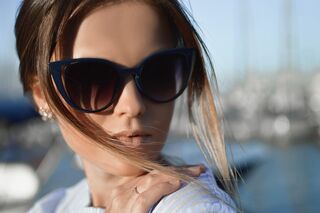Beauty
Are You More Attractive in Sunglasses?
How your shades make an impression, in more ways than one.
Posted June 12, 2022 Reviewed by Devon Frye
Key points
- Some people are more attractive in a flattering set of shades because confidence itself is attractive.
- Sunglasses add facial symmetry, which is visually appealing.
- First impressions will never quite as intimate as they could be if you could lock eyes with a new acquaintance.
- Sunglasses may lessen judgments of trustworthiness.
Sunglasses are often associated with movie stars and celebrities, adding glamour, flash, and style. Both fashionable and practical, they are an easy way to accentuate your look. But sunglasses also add an element of mystique, hiding your most revealing feature behind tinted windows: your eyes.
Accordingly, first impressions will never be quite as intimate as they could be if you were able to lock eyes with new acquaintances. As you decide whether sporting expensive shades are worth the expense of bonding through eye contact, also consider how your appearance and image are impacted by hiding half of your face.
Yet because sunglasses are also an attractive accessory, research makes some interesting observations on the pros and cons of shading your eyes and enhancing your image.

Sunglasses and Social Traits
In 2019, Daisy L. Graham and Kay L. Ritchie [i] investigated how wearing glasses and sunglasses impacted the perception of social traits from faces and face matching. They had participants view and rate images of people wearing no glasses, glasses, and sunglasses on the social traits of trustworthiness, attractiveness, and competence. Graham and Ritchie found that wearing sunglasses decreased ratings of trustworthiness.
A few years later, studying pandemic-related facial obstructions, Rachel J. Bennetts et al. (2022) conducted research on face masks versus sunglasses. [ii] Although their main focus was the effects of masks, Bennetts et al. note that their results are different from Graham and Ritchie (2019), who found limited effects of sunglasses on judgments of competence and attractiveness. Bennetts et al. suggest these differences may be due in part to the likelihood that people wear sunglasses that match the shape of their face in order to enhance their appearance, particularly when they are uploading images to the Internet.
Cool, Confident, Fashionable Facial Symmetry
Some people wear sunglasses to feel hip, cool, and confident. Contrary to people who seek to “hide” behind tinted lenses out of insecurity, some people are actually more attractive in a flattering set of shades because confidence itself is attractive, which might account for the perception of image enhancement. But there are other reasons some people look better in sunglasses.
Vanessa Brown with Nottingham Trent University suggests that perhaps sunglasses make people more attractive because they add facial symmetry, which makes people more appealing. [iii] Also the author of “Cool shades: the history and meaning of sunglasses,” [iv] Brown explains how sunglasses have evolved as a culturally significant iconic fashion staple through the years, and have been linked to a colorful cast of celebrities and other notables, as well as different eras of fashion.
So, the ability of sunglasses to improve your image apparently may depend on the ones you choose. Pairing practical utility with physical appeal, choose your shades carefully in order to maximize functionality and make a great first impression.
References
[i] Graham, Daisy L., and Kay L. Ritchie. 2019. “Making a Spectacle of Yourself: The Effect of Glasses and Sunglasses on Face Perception.” Perception 48 (6): 461–70. doi:10.1177/0301006619844680.
[ii] Bennetts, Rachel J., Poppy Johnson Humphrey, Paulina Zielinska, and Sarah Bate. 2022. “Face Masks versus Sunglasses: Limited Effects of Time and Individual Differences in the Ability to Judge Facial Identity and Social Traits.” Cognitive Research: Principles and Implications 7 (February). doi:10.1186/s41235-022-00371-z.
[iii] https://www.aol.com/news/2014-06-30-study-says-wearing-shades-makes-you….
[iv] Cool shades: the history and meaning of sunglasses. Bloomsbury, 2015.


